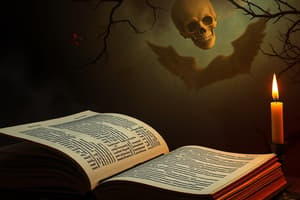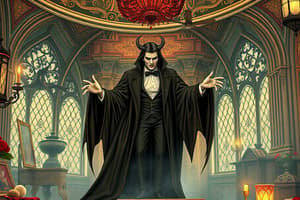Podcast
Questions and Answers
What role does atmosphere play in Gothic literature?
What role does atmosphere play in Gothic literature?
- It creates a stable environment for characters.
- It focuses solely on the beauty of the setting.
- It is crucial for establishing suspense and emotional impact. (correct)
- It introduces romantic elements exclusively.
How does isolation affect characters in Gothic literature?
How does isolation affect characters in Gothic literature?
- It guarantees their safety from threats.
- It disconnects them from their past completely.
- It leads to enhanced emotional experiences and identity struggles. (correct)
- It makes them more popular in society.
What is a common representation of the supernatural in Gothic literature?
What is a common representation of the supernatural in Gothic literature?
- It appears only in historical contexts.
- It is primarily concerned with technological advancements.
- It manifests through ghosts, monsters, or inexplicable events. (correct)
- It serves as a literal escape from reality.
In Gothic literature, how does nature often reflect characters' emotions?
In Gothic literature, how does nature often reflect characters' emotions?
What theme is represented by characters grappling with their past in Gothic literature?
What theme is represented by characters grappling with their past in Gothic literature?
Flashcards
What is the significance of atmosphere in Gothic literature?
What is the significance of atmosphere in Gothic literature?
The setting of Gothic literature is often eerie, dark, and full of uncertainty, creating a sense of suspense and drawing the reader into a world of the unknown.
How are characters portrayed in Gothic literature?
How are characters portrayed in Gothic literature?
Characters in Gothic literature are often complex and torn between inner desires and fears, haunted by their past or struggling with internal demons.
What purpose does the supernatural serve in Gothic literature?
What purpose does the supernatural serve in Gothic literature?
Gothic literature frequently incorporates supernatural elements like ghosts, monsters, or strange events as metaphors for hidden fears and societal anxieties, challenging the boundaries of reality.
What is the role of isolation in Gothic literature?
What is the role of isolation in Gothic literature?
Signup and view all the flashcards
How does the past influence characters in Gothic literature?
How does the past influence characters in Gothic literature?
Signup and view all the flashcards
Study Notes
Gothic Literature Themes
- Gothic literature combines horror, romance, and the supernatural.
- It explores the darker aspects of the human psyche and the mysteries of existence.
- Recurring themes reveal the genre's captivating and enduring significance.
Atmosphere of Mystery
- Settings in Gothic literature are often eerie and filled with shadows.
- Uncertainty and suspense are key elements, drawing readers into the narrative.
- The unknown lurking around every corner enhances the emotional impact.
Complex Characters
- Gothic characters are often torn between desire and fear.
- Protagonists may grapple with past traumas or internal demons.
- This tension between light and darkness allows readers to explore complex human emotions and morality.
Supernatural Elements
- Supernatural elements, like ghosts, monsters, or unexplained events, are central to Gothic literature.
- These elements serve as metaphors for repressed fears and societal anxieties.
- They push characters towards self-discovery and transformation.
Isolation and Alienation
- Isolation is a prevalent theme, often depicting characters alienated from society.
- Characters in this genre struggle with identity and belonging, facing hostility and misunderstanding.
- This isolation heightens their emotional experiences.
Role of the Past
- The past significantly shapes the present in Gothic narratives.
- Characters frequently grapple with hidden secrets and traumas from the past, forcing them to confront their history.
- The past's power suggests the impossibility of escaping its shadows.
Nature as a Reflection
- Nature in Gothic literature mirrors characters' emotional states.
- Storms, darkness, and wild landscapes symbolize inner turmoil and chaos.
- This connection between nature and human emotion influences the reader's engagement with the story.
Fear and the Unknown
- Fear of the unknown is a central theme in Gothic literature.
- Events and characters facing fear and anxieties encourage readers to confront their own anxieties.
- This genre is both thrilling and introspective due to this fear.
Romance and Tragedy
- Romance often intersects with tragedy in Gothic literature.
- Passionate relationships frequently end in heartbreak and loss, highlighting human connection's fragility.
- The chaos of surroundings accentuates this fragility.
The Castle Symbolism
- Castles in Gothic literature represent power, mystery, and entrapment.
- They often serve as settings for both romantic encounters and terrifying events.
- The castle summarizes the duality and secrets of human experience.
Conclusion: Embracing the Shadows
- Gothic literature encourages readers to explore the hidden aspects of the human experience.
- Mystery, fear, and romance challenge readers to confront their own darkness.
- The genre serves as a powerful lens for understanding the human condition.
Studying That Suits You
Use AI to generate personalized quizzes and flashcards to suit your learning preferences.




